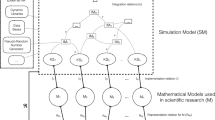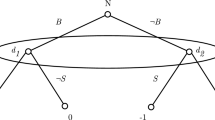Abstract
Nick Bostrom’s ‘Simulation Argument’ purports to show that, unless we are confident that advanced ‘posthuman’ civilizations are either extremely rare or extremely rarely interested in running simulations of their own ancestors, we should assign significant credence to the hypothesis that we are simulated. I argue that Bostrom does not succeed in grounding this constraint on credence. I first show that the Simulation Argument requires a curious form of selective scepticism, for it presupposes that we possess good evidence for claims about the physical limits of computation and yet lack good evidence for claims about our own physical constitution. I then show that two ways of modifying the argument so as to remove the need for this presupposition fail to preserve the original conclusion. Finally, I argue that, while there are unusual circumstances in which Bostrom’s selective scepticism might be reasonable, we do not currently find ourselves in such circumstances. There is no good reason to uphold the selective scepticism the Simulation Argument presupposes. There is thus no good reason to believe its conclusion.
Similar content being viewed by others
Notes
See Sect. 4 for further discussion of this point.
See Bostrom (2008) for a version of the Simulation Argument along these lines. I am also grateful to Sacha Golob and an anonymous referee for independently pressing this line of response.
I thank an anonymous referee for suggesting a response along these lines.
This strong brand of evidential internalism is of course contentious; see Williamson (2000) for criticism. I grant it here so as to give Bostrom’s argument the best chance of succeeding.
For trenchant criticism of Elga’s argument, see Weatherson (2005).
References
Barrow, J. D. (2007). Living in a simulated universe. In B. Carr (Ed.), Universe or multiverse (pp. 481–486). Cambridge: Cambridge University Press.
Bostrom, N. (2003a). Are we living in a computer simulation? Philosophical Quarterly, 53, 243–255.
Bostrom, N. (2003b). The transhumanism FAQ. Retrieved on 25 March 2012 from http://www.transhumanism.org/resources/FAQv21.pdf.
Bostrom, N. (2005). The simulation argument: Reply to Weatherson. Philosophical Quarterly, 55, 90–97.
Bostrom, N. (2008). The simulation argument FAQ. Retrieved on 25 March 2012 from http://www.simulation-argument.com/faq.html.
Bostrom, N. (2009). The simulation argument: Some explanations. Analysis, 69, 458–461.
Bostrom, N. (2010). Ideas of the century: The simulation argument. Philosopher’s Magazine, 50, 28–29.
Bostrom, N., & Kulczycki, M. (2011). A patch for the simulation argument. Analysis, 71, 64–71.
Dupré, B. (2007). 50 Philosophy ideas you really need to know. London: Quercus.
Elga, A. (2004). Defeating Dr. Evil with self-locating belief. Philosophy and Phenomenological Research, 69, 383–396.
Hanson, R. (2001). How to live in a simulation [Online]. Journal of Evolution and Technology, 7. Retrieved on 25 March 2012 from http://www.transhumanist.com/volume7/simulation.html.
Jenkins, P. S. (2006). Historical simulations—Motivational, ethical and legal issues. Journal of Future Studies, 11, 23–42.
Lewis, D. K. (1979). Attitudes de dicto and de se. Philosophical Review, 88, 513–543.
Steinhardt, E. (2010). Theological implications of the simulation argument. Ars Disputandi, 10, 23–37.
Tierny, J. (2007). Our lives, controlled from some guy’s couch. New York Times, 17 August 2007.
Weatherson, B. (2003). Are you a sim? Philosophical Quarterly, 53, 425–431.
Weatherson, B. (2005). Should we respond to evil with indifference? Philosophy and Phenomenological Research, 70, 613–625.
Williamson, T. (2000). Knowledge and its limits. Oxford: Oxford University Press.
Acknowledgments
I thank Sorin Bangu, Alex Broadbent, Jeremy Butterfield, Sacha Golob, Nick Jardine, Tim Lewens, Brian Weatherson, three anonymous referees, and an audience at the University of Cambridge for helpful comments. This work was supported by the Arts and Humanities Research Council.
Author information
Authors and Affiliations
Corresponding author
Rights and permissions
About this article
Cite this article
Birch, J. On the ‘Simulation Argument’ and Selective Scepticism. Erkenn 78, 95–107 (2013). https://doi.org/10.1007/s10670-012-9400-9
Received:
Accepted:
Published:
Issue Date:
DOI: https://doi.org/10.1007/s10670-012-9400-9




